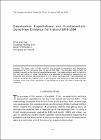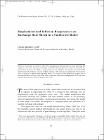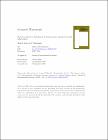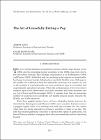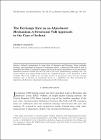Browsing by Subject "Exchange rates"
Now showing items 1-13 of 13
-
Costs of exchange rate volatility for labour markets: empirical evidence from the CEE economies
(Economic & Social StudiesDublin, 2003)According to the traditional `optimum currency area? approach, little will be lost from a very hard peg to a currency union if there is little reason for using the exchange rate in response to economic shocks. This paper ... -
Devaluation expectations and fundamentals: some new evidence for Ireland 1979-1994
(Economic & Social StudiesDublin, 2001)This paper uses a Probit model to link economic fundamentals with devaluation expectations for the Irish pound over the period 1979-1994. The estimates relate to both the probability as well as the size of an expected ... -
Employment and inflation responses to an exchange rate shock in a calibrated model
(Economic & Social StudiesDublin, 2006)Ireland has no ability to affect the exchange rate through interest rates following the adoption of the euro. This paper provides a theoretically transparent method for analysing the impact of an exchange rate shock on ... -
"Fiscal policies, devaluations and exchange rate regimes": a comment
(Economic & Social StudiesDublin, 1992)A characteristic of many small countries is their propensity to compare domestic performance with that of the outside world. The Irish are much given to this practice. Different comparators are taken depending on the nature ... -
Fiscal policies, devaluations and exchange rate regimes: the stabilisation programmes of Ireland and Greece
(Economic & Social StudiesDublin, 1992)This paper contrasts the stabilisation programmes of Ireland and Greece in the 1980s and draws out lessons for the design of such programmes in small open economies. Programmes relying on government revenue increases are ... -
The long or short of it: Determinants of foreign currency exposure in external balance sheets
(Elsevier, 2009)A major focus of the recent literature on the determination of optimal portfolios in open-economy macroeconomic models has been on the role of currency movements in determining portfolio returns that may hedge various ... -
Pricing to market, exchange rate changes and the transmission of inflation
(Economic & Social StudiesDublin, 1998)This paper examines the short-run pass through of exchange rate changes to consumer prices in Ireland. Reflecting the importance of exchange rate expectations, we develop a model of inflation where the deviation of the UK ... -
Quantifying the non-stationarity in Irish real exchange rates
(Economic & Social StudiesDublin, 1993)Empirical work, both in Ireland and elsewhere, has found little evidence for the proposition that log-real exchange rates are stationary, implying that the purchasing power parity (PPP) relation cannot hold, not even in a ... -
Sterling movements and Irish pound interest rates
(Economic & Social StudiesDublin, 1994)Despite convergence of inflation to below the system's average, Ireland experienced volatile short-term interest rates in the EMS. Much of the volatility comes from periods of Sterling weakness being associated with higher ... -
The art of gracefully exiting a peg
(Economic & Social StudiesDublin, 2003)The wave of liberalisation of capital movements, which swept Europe in the 1980s and the emerging market countries in the 1990s, has given rise to the two-corner strategy. This strategy, expounded e.g. by Eichengreen (1994) ... -
The exchange rate as an adjustment mechanism: a structural VAR approach to the case of Ireland
(Economic & Social StudiesDublin, 2003)Ireland?s participation in stage three of Economic and Monetary Union precludes exchange rate adjustment in response to asymmetric shocks. A Structural VAR model is used to decompose the effects of asymmetric supply, demand ... -
The influence of sterling on Irish interest rates
(Economic & Social StudiesDublin, 1995)The influence of the Sterling real exchange rate on the Irish-German interest rate differential is assessed over the period 1987 to 1992. The estimation allows for structural change by permitting time variation in the ... -
The optimum level of reserves in an exchange rate target zone
(Economic & Social StudiesDublin, 1993)The target zone exchange rate literature, initiated by Krugman (1991), has relevance for the question of what is the optimal level of reserves. In particular, Krugman and Rotemberg (1990) show that there is a well defmed ...





